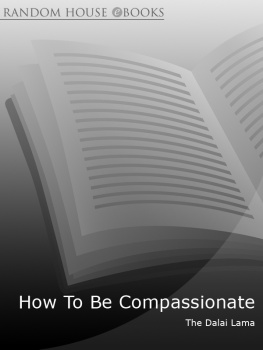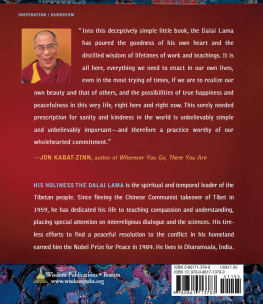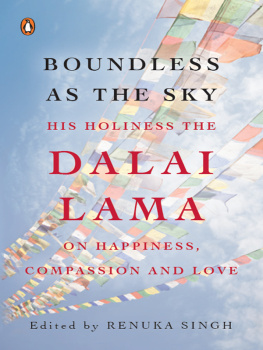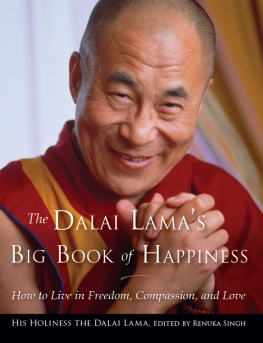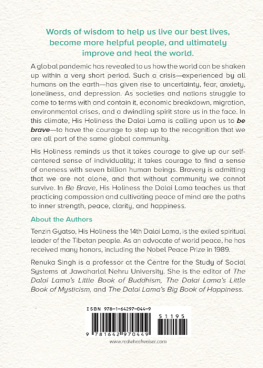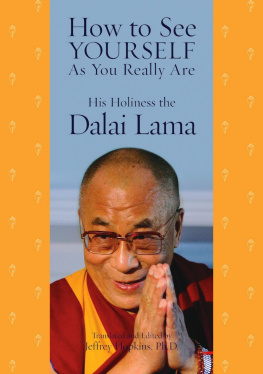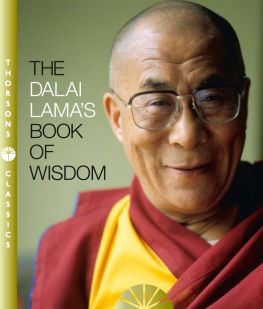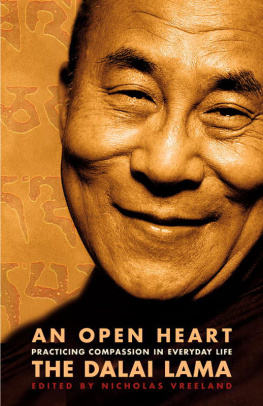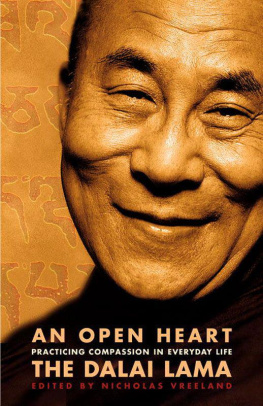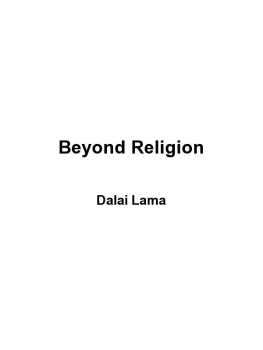This eBook is copyright material and must not be copied, reproduced, transferred, distributed, leased, licensed or publicly performed or used in any way except as specifically permitted in writing by the publishers, as allowed under the terms and conditions under which it was purchased or as strictly permitted by applicable copyright law. Any unauthorised distribution or use of this text may be a direct infringement of the authors and publishers rights and those responsible may be liable in law accordingly.
Version 1.0
Epub ISBN 9781446491836
www.randomhouse.co.uk
A Division of Simon & Schuster, Inc.
1 3 5 7 9 10 8 6 4 2
This edition published in 2011 by Rider, an imprint of Ebury Publishing
A Random House Group company
First published in the USA in 2011 by Atria Books
a division of Simon & Schuster Inc.
Copyright 2011 by His Holiness The Dalai Lama
Published in arrangement with the original publisher, Atria Books, an imprint of Simon & Schuster, Inc. NY
Jeffrey Hopkins PhD is the translator into English and editor of the original oral Tibetan materials
His Holiness The Dalai Lama has asserted his right to be identified as the author of this Work in accordance with the Copyright, Designs and Patents Act 1988
All rights reserved. No part of this publication may be reproduced, stored in a retrieval system, or transmitted in any form or by any means, electronic, mechanical, photocopying, recording or otherwise, without the prior permission of the copyright owner
The Random House Group Limited Reg. No. 954009
Addresses for companies within the Random House Group can be found at: www.randomhouse.co.uk
A CIP catalogue record for this book is available from the British Library
ISBN 9781846042966
To buy books by your favourite authors and register for offers visit: www.randomhouse.co.uk
Contents
Foreword
WHEN THE CHINESE Communist government in Beijing hears that His Holiness the Dalai Lama has been invited to visit a country, it immediately files an objection with that nations leaders, who all too often then find his visit to be inconvenient, or downscale the visit, or make it personal. What do Chinese officials fear? The Dalai Lama has no army, no economic power, and no political cards to play. He advocates nonviolence and compassion. What do they fear?
The Chinese Communist government in Beijing offered to negotiate with His Holiness anywhere at any time, so long as the Dalai Lama did not bring up the topic of Tibetan independence. He has not raised that topic since 1978, but still, the response from Beijing has been to make all sorts of conditions. What do they fear?
His Holiness the Dalai Lama has inspired the rebuilding of Tibetan cultural institutions outside of Tibet. He has asked the religious and political leaders of the world to look beyond their narrow interests to the greater good. He has advocated paying attention to the basic needs of all people, regardless of religion or politicsplacing an emphasis on compassion and kindness. Is this what is feared?
Unlike Mao, who said power comes from the barrel of a gun, the Dalai Lama says the greatest power comes from compassion in your heartthe power to gradually create harmony and peace throughout the world. In Tibetan, and increasingly in English, he speaks with breadth, depth, intelligence, humor, and sincerity that inspire insight and motivate people to dedicate themselves to the welfare of others. I believe that he has inspired more people to work together with him on more books than any leader in world history.
In this brief book, I have gathered essential teachings of this world-renowned leader, whose messagethat compassion is essential for individuals and for the worldis as renowned as the bearer himself. When we think of the Dalai Lama, we immediately think of the compassion he embodies, to which he has devoted his entire life.
In these pages, he calls us to pay attention to our own heartsto our orientation to everyone and everything around us. His Holiness points out mistakes of attitude, how we make them, and how we can correct them for a better future. He begins by explaining how caring for others can be a profound source of happiness on an individual level, which can then be extended outward in wider and wider circles. Then, in nine subsequent chapters, he describes basic mistakes that lead to personal turmoil and interpersonal disruption, along with solutions for these problems. He focuses on the nature of hatred, because of its central role in undermining our potential for unbounded compassion, and then asks us to examine the nature of consciousness so that we understand how transformation of attitude is possible. This leads to three chapters on how to implement compassion in daily life, and a final chapter of heartfelt advice on how to live with greater and greater care and concern for all beings.
The Dalai Lamas full name, translated from Tibetan into English syllable by syllable, is Leader, Holiness, Gentleness, Renown, Speech, Dominion, Mind, Goodness, Primordial, Wisdom, Teaching, Hold, Vastness, Ocean, Being, Triad, Controlling, Unparalleled, Glory, Integrity. (Tibetan: rJe btsun jam dpal ngag dbang blo bzang ye shes bstan dzin rgya mtsho srid gsum dbang bsgyur mtshungs pa med pai sde dpal bzang po.) Here is a poem I wrote in the mid nineteen-seventies, inspired by the Dalai Lamas name.
Leader of the world recognized for true holiness,
Gentleness personified in persuasive renown,
Speech of compassion pervading the planet in its dominion,
Mind of altruistic endeavor reaching all in its goodness,
Primordial in the depth and range of profound wisdom,
Teaching encompassing all phenomena in its hold,
Vastness of loves deeds rippling throughout lifes ocean,
Being so merciful displayed in sufferings triad,
Controlling the unruly through kindness unparalleled,
Glory in forms of endeavor sealed in total integrity,
May the teacher of the world, bearing compassion
And wisdom indissoluble, see all obstacles dissolve.
Throughout the thirty-nine years that I have known the Dalai Lama and during the ten that I served as his chief translator on lecture tours in the United States, Canada, Indonesia, Singapore, Malaysia, Australia, Great Britain, and Switzerland, I have witnessed how he embodies compassion to the very core of his being. It is important for us to recognize that this insightful, compassionate, humorous, and marvelous person rose from Tibetan culture. We need to value that culture as one of the worlds great wonders.

